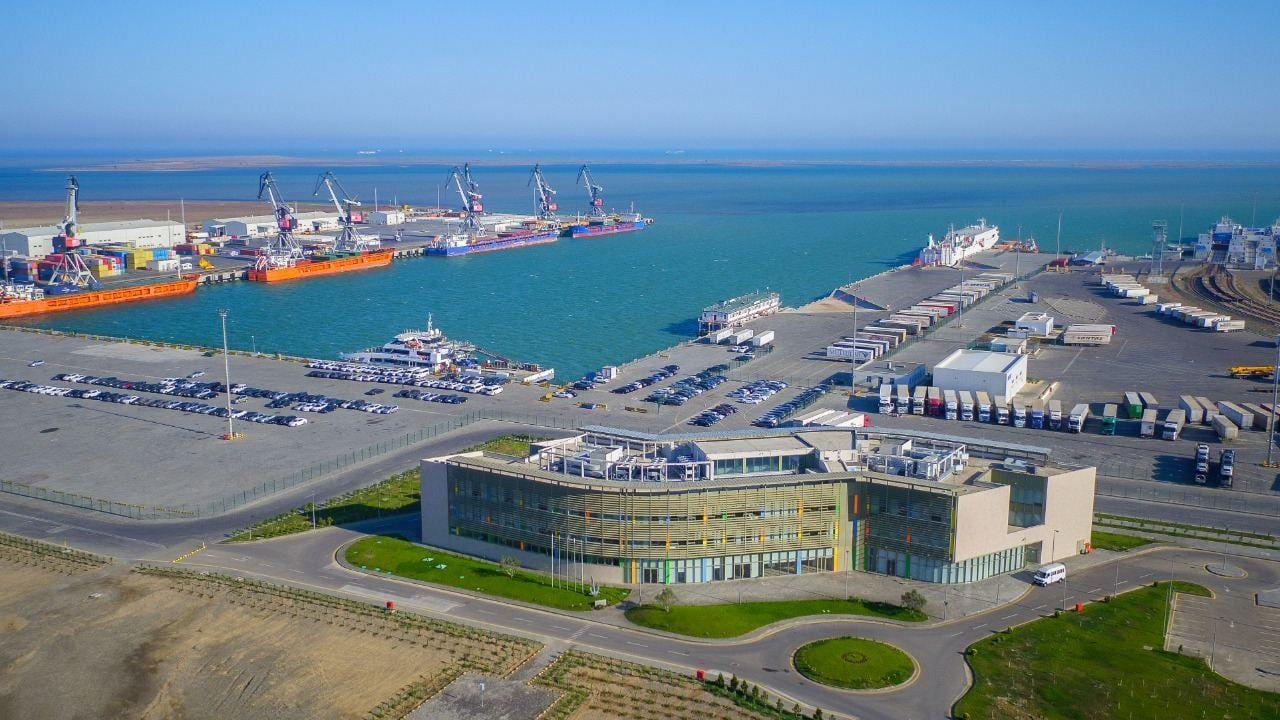
Middle Corridor Boosts Baku Port's Cargo Handling Capacity
Baku Port, or Port of Baku, a crucial component of the Middle Corridor route, reported a total cargo volume of 7.6 million tons handled in 2024. This marks a 3.2% increase compared to the corresponding figure for 2023, showcasing substantial growth in various sectors. Container transport saw an impressive rise of over 73%, overall cargo handling volume increased by more than 3%, and the transportation of wheeled vehicles grew by over 7%.
Port of Baku, located on the ancient Silk Road connecting Europe and Asia, is a prime transport and logistics hub of Eurasia. It covers an area of 400 hectares. Being an important segment of the Trans-Caspian International Transport Route, the Port of Baku with its modern operating system provides prompt cargo services, as well as has at its disposal open and covered storage facilities designed for all types of cargo.
With a lifting capacity of 15 million tons a year and a container loading capacity of 100,000 TEU a year, the Port of Baku meets international standards.
The Port is enabled to handle more containers
One of the most notable increases was observed in the number of containers handled at Baku Port. In 2024 alone, the port managed 76,775 TEUs (Twenty-Foot Equivalent Units), reflecting a 73% rise compared to 2023. This surge underscores Baku Port's growing capacity and efficiency in container handling. The number of wheeled vehicles received and dispatched at Baku Port in 2024 reached 58,169 units, indicating a 7.2% increase from the previous year. Additionally, the volume of dry cargo handled exceeded 1,044,000 tons, and the number of wagons processed surpassed 37,515 units, both showing significant year-on-year growth.
The Middle Corridor, also known as the Trans-Caspian International Transport Route, plays a pivotal role in connecting East and West. It serves as a vital trade link between China, Central Asia, the Caucasus, and Europe. The corridor spans multiple countries, including Kazakhstan, Azerbaijan, Georgia, and Turkiye, facilitating the movement of goods across vast distances.
The strategic importance of the Middle Corridor cannot be overstated. It offers an alternative route to the traditional Northern Corridor, which passes through Russia and is subject to geopolitical tensions and logistical challenges. The Middle Corridor provides a more stable and efficient pathway, reducing transit times and costs for international trade.
As a key transit hub along the Middle Corridor, Baku Port plays a crucial role in facilitating the movement of goods between East and West. Located on the western shore of the Caspian Sea, Baku Port serves as a major gateway for cargo entering and exiting the region. Its strategic location makes it an essential link in the transportation network, connecting maritime routes with rail and road transport.
Major upgrades boost the handling of the diverse range of cargo
The port's infrastructure has been significantly upgraded in recent years to accommodate increasing cargo volumes and enhance operational efficiency. Modern facilities, advanced equipment, and streamlined processes have contributed to the port's ability to handle a diverse range of cargo, including containers, wheeled vehicles, and dry bulk.
The impressive growth in cargo handling at Baku Port reflects Azerbaijan's strategic efforts to enhance its transportation infrastructure and expand its role in international trade. The significant rise in container handling, wheeled vehicle transportation, and dry cargo volumes underscores the port's capacity to meet increasing demand and its importance as a key transit hub in the region. As Baku Port continues to develop and improve its operations, it is poised to play a vital role in facilitating global trade and strengthening Azerbaijan's economic position on the international stage.
Transit cargo constituted over 5.3 million tons, accounting for 70% of the total cargo handled. This increase highlights the growing interest of third countries in international transport corridors passing through Azerbaijan, particularly the Middle Corridor. The port's ability to efficiently manage transit cargo is crucial for maintaining the competitiveness of the Middle Corridor as a preferred route for international trade.
Looking ahead, Baku Port is expected to continue its upward trajectory, driven by ongoing investments in infrastructure and technology. The port's strategic importance and capacity to handle large volumes of cargo make it a key player in the Middle Corridor. As global trade dynamics evolve, Baku Port is well-positioned to capitalize on emerging opportunities and further strengthen its role in the international supply chain.
The port's development is also aligned with Azerbaijan's broader economic goals of diversifying its economy and enhancing its connectivity with global markets. By leveraging its strategic location and modern infrastructure, Baku Port is set to contribute significantly to the country's economic growth and regional integration.
The substantial increase in cargo handling at Baku Port in 2024 highlights its critical role in the Middle Corridor and its impact on Azerbaijan's economy. The port's ability to manage growing volumes of containerized cargo, wheeled vehicles, and dry bulk reflects its strategic importance as a transit hub. As Baku Port continues to enhance its infrastructure and operations, it is poised to play a pivotal role in facilitating global trade, promoting regional connectivity, and supporting Azerbaijan's economic development.
Legal Disclaimer:
MENAFN provides the
information “as is” without warranty of any kind. We do not accept
any responsibility or liability for the accuracy, content, images,
videos, licenses, completeness, legality, or reliability of the information
contained in this article. If you have any complaints or copyright
issues related to this article, kindly contact the provider above.


















Comments
No comment